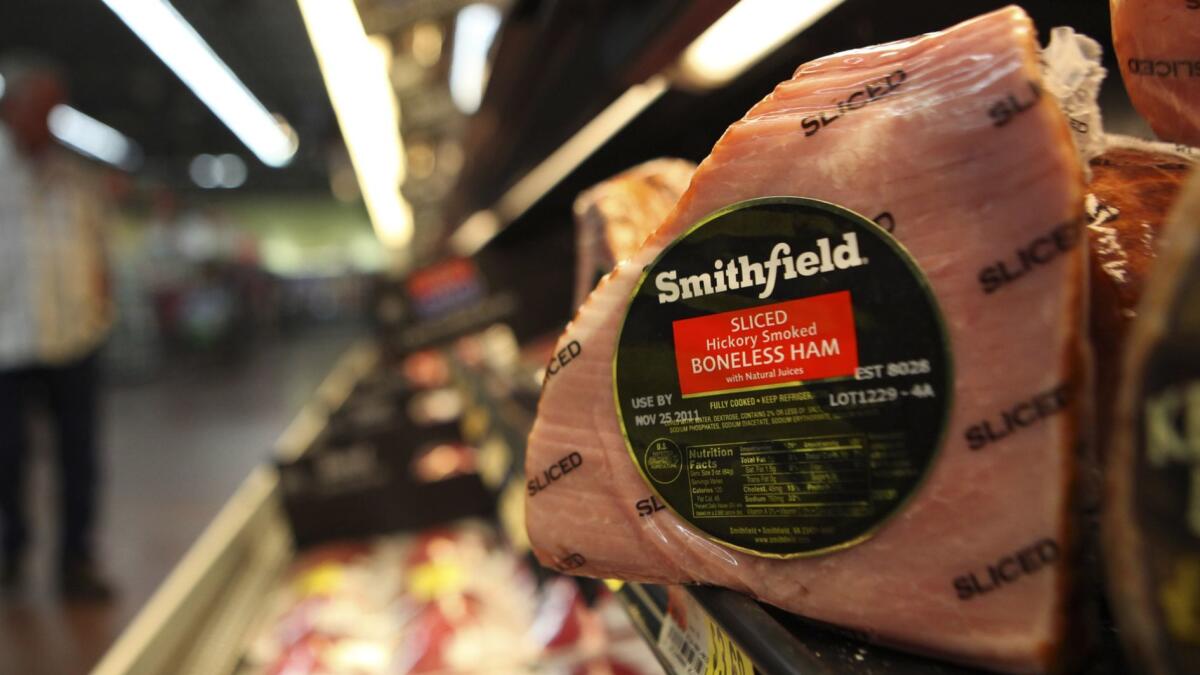Chinese-owned pork producer is getting U.S. bailout money to protect it from China’s tariffs

- Share via
A Chinese-owned pork producer will sell at least $240,000 worth of ham products to the federal government as part of the Trump administration’s farm bailout program, the administration said Wednesday.
U.S. pork producer Smithfield, which is owned by the Chinese conglomerate WH Group, will sell 144,000 pounds of ham products to the federal government under the contract.
The Agriculture Department is purchasing pork and other commodities from U.S. farmers to help offset the damage from retaliatory tariffs imposed by China this summer. The administration has pitched the relief as a necessary short-term measure to help farmers weather the trade battle.
The Agriculture Department announced about $7.5 million worth of awards under the purchase program on Wednesday, according to a notice released by the department’s Agricultural Marketing Service, which is administering the purchase program. Smithfield could receive more taxpayer money in subsequent rounds of the purchasing program.
The agency said in August that it would buy $1.2 billion worth of products from farmers, including more than $500 million from pork producers, but the exact timing of those purchases has not been released. The Trump administration has authorized $12 billion in overall spending for the bailout program, including direct cash payments to farmers, particularly soybean producers.
The Agriculture Department said last month that Smithfield qualified for the bailout money, noting that the agency would be purchasing only goods produced in the United States. Sen. Charles E. Grassley (R-Iowa), a farmer and member of the Senate Agriculture Committee, has expressed alarm that a Chinese-owned firm could benefit from bailout money intended to help American farmers survive a trade war with China.
The timing of Wednesday’s announcement raised some eyebrows.
“It is highly suspicious that this announcement came a day after the midterm elections,” said Tony Corbo, senior lobbyist at Food and Water Watch, which tracks federal agriculture programs. “Congress needs to exercise oversight of this program. This is an example of corporate welfare at its worst.”
The USDA marketing service said in a statement last month that the products it will buy are “100 [percent] American produced.” In a separate statement, the USDA’s central communications office said the agency could not control whether federal money given to U.S. subsidiaries would enrich their Chinese owners.
“USDA does not have the ability to police whether money will eventually ‘filter to the Chinese,’” a USDA spokesman said in an email. “The Department goes to great lengths to ensure we have registered, approved U.S. vendors that work closely with the Agricultural Marketing Service.”
Smithfield has said it meets the federal government’s criteria for the program. Keira Lombardo, senior vice president of corporate affairs at Smithfield, said in an email last month that the company meets the USDA’s eligibility standards and that “any approved vendor that can supply the requested product can bid for the contract.”
Lombardo also said that Smithfield is a U.S.-based company employing thousands of Americans and that its U.S. meat products are made in its nearly 50 domestic facilities.
Smaller hog producers have expressed anger over the possibility of money flowing to foreign-owned businesses, noting that the bailout has been billed as a support for domestic firms. But the international reach of companies makes it hard to ensure that federal dollars stay in U.S. hands, regardless of their intended target.
The White House created the bailout program unilaterally, without congressional approval, under a rarely used farm program from the Great Depression. Two senators — Grassley and Sen. Jon Tester (D-Mont.), who is also a farmer and who narrowly won reelection Tuesday — have said they will be applying for direct help from the federal government.
More to Read
Inside the business of entertainment
The Wide Shot brings you news, analysis and insights on everything from streaming wars to production — and what it all means for the future.
You may occasionally receive promotional content from the Los Angeles Times.










